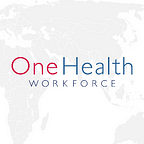Fostering Interdisciplinary Collaboration in the Future One Health Workforce
University of Rwanda students participate in an infectious disease management training that encouraged them to collaborate across disciplines before they join the health workforce.
An increasing human population demands more livestock for food and animal products, along with more land and water to support both livestock and human populations. In areas where land and water are limited, the pressure and competition for those resources from human, livestock and wildlife populations highlights a complex global challenge.
This interface, interaction, and interconnectedness between populations is theorized to be one of the main drivers increasing the risk of emerging diseases by contributing to the emergence, amplification, and globalization of infectious agents. This is the reason why the World Health Organization considers Rwanda a hotspot for emerging and re-emerging infectious diseases.
Based on this fact, the One Health Central and Eastern Africa (OHCEA) network strives to create a critical mass of cadres who are able to effectively respond to these outbreaks. Akagera National Park is not new to these pressures and challenges. The park follows the Eastern border of Rwanda with Tanzania, and is surrounded by a military camp, and some of the most fertile pasture and cattle grazing land in the country.
The OHCEA network’s Rwanda office conducted a one-week infectious disease management (IDM) training workshop for final year students on June 20–24, 2016 at the University of Rwanda, Nyagatare Campus. The workshop focused on fostering interdisciplinary collaboration among the future One Health workforce.
The training team included highly experienced government officials, such as RBC, RAB, and faculty from the University of Rwanda College of Agriculture, Animal Science and Veterinary Medicine, and College of Medicine and Health Sciences. A team of faculty from the University of Nairobi (Kenya), Moi University (Kenya), and Tufts University (USA) joined the facilitators of the workshop.
Training in Action
This training brought together 150 final year students from the University of Rwanda from their various Programs and Campuses (Nyagatare, Nyarugenge, Nyamishaba and Huye). These programs included General Medicine, Wildlife and Aquatic Resources Management, Zoology, General Nursing, Biotechnology, Clinical Medicine, Environmental Health and Epidemiology, Nutrition and Dietetics and students from the department of Veterinary Medicine.
These multidisciplinary students showcased the One Health approach, a concept that recognizes that human health, animal health and ecosystem health are inextricably linked, and that collaboration across sectors is needed to achieve more rapid, mutually beneficial and effective responses.
The training covered these types of relationships and how to apply multidisciplinary approaches to infectious disease and outbreaks investigation and response. It also encouraged the students to collaborate across these disciplines since they are the future One Health workforce.
The students learned about many of the One Health Core Competencies, including risk communication; leadership and management; social, culture, and gender; and systems thinking.
The lessons were taught on basic theoretical background followed by group work for each module. The students were divided into 10 multidisciplinary groups. Two faculty members mentored each group but most of the work was student-led once in the groups.
Role plays were a key feature in this training where different diseases were assigned to different groups and requested to demonstrate transmission, clinical signs, prevention and control.
This teaching technique promotes a better understanding of the disease transmission cycle and how it can be mitigated to avoid further spill over or spread. The 10 multidisciplinary student groups were each assigned a disease, including Rabies, Schistosomiasis, Ebola, Brucellosis, Echnococus, Rift Valley Fever and Malaria, among others.
The students actively participated in the role plays and enjoyed the opportunity to thoroughly understand the problem, rather than the usual class approaches (lectures) that encourage cram work. The problem-based learning approach helped students from other disciplines realize the importance of working in multidisciplinary teams.
In order to clearly understand the ecosystem, a field trip to the Nyagatare rice scheme was organized. The multidisciplinary teams identified public health challenges that needed to be addressed. The issues included herbicide and pesticide pollution in Muvumba River, Schistosomiasis risks, land degradation, and the prevalence of malaria in the surrounding communities, among others. The field trip provided an opportunity for the teams to strategically think about health issues in real-world situations.
The Way Forward
At the close of the training workshop, students committed to implementing the lessons learned in the training and sharing the knowledge with other health related professionals.
About the Authors
Mapendo MINDJE and Benjamin NDAYAMBAJE are both alumni and now advisers for the University of Rwanda-One Health Students Club associated with the One Health Central and Eastern Africa network, a network supported by the USAID One Health Workforce project.
The One Health Central and Eastern Africa network’s Rwanda office trains the current and future One Health workforce to prevent, detect, and respond to infectious disease threats.
